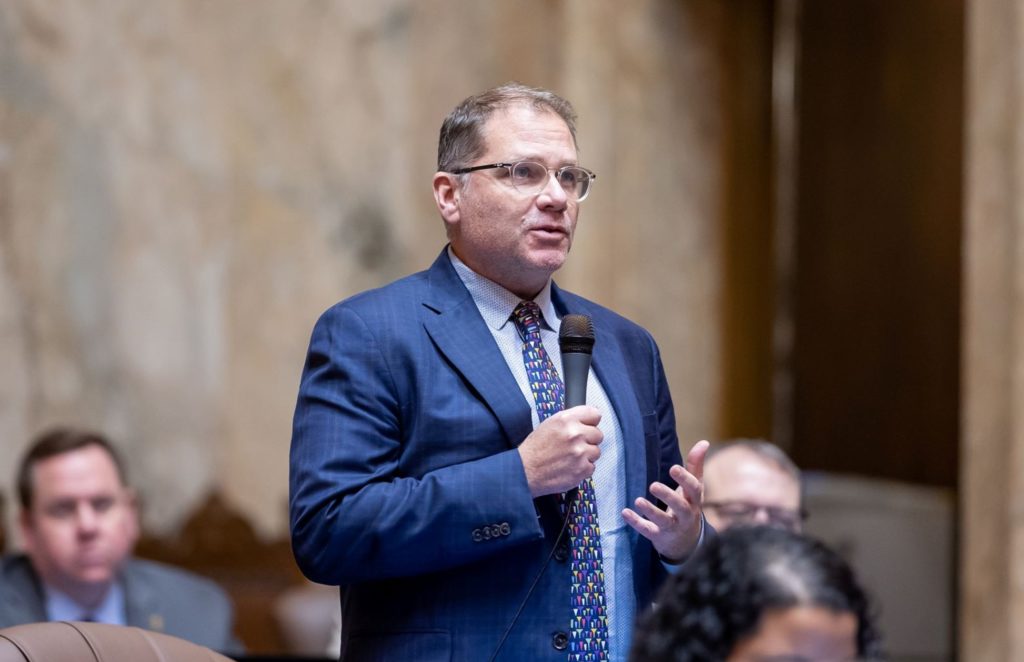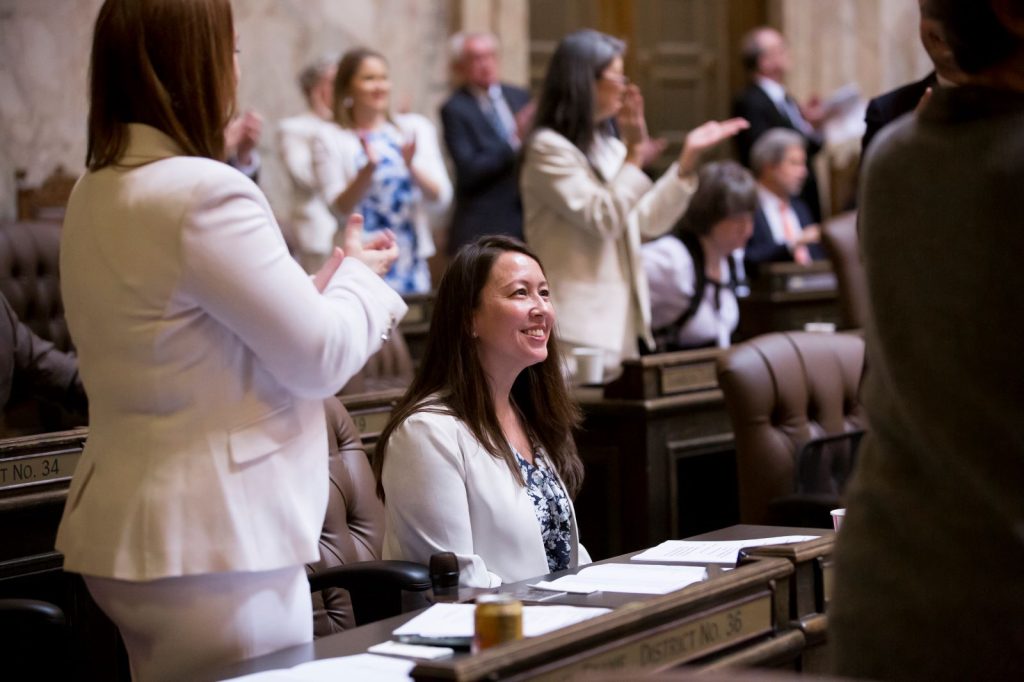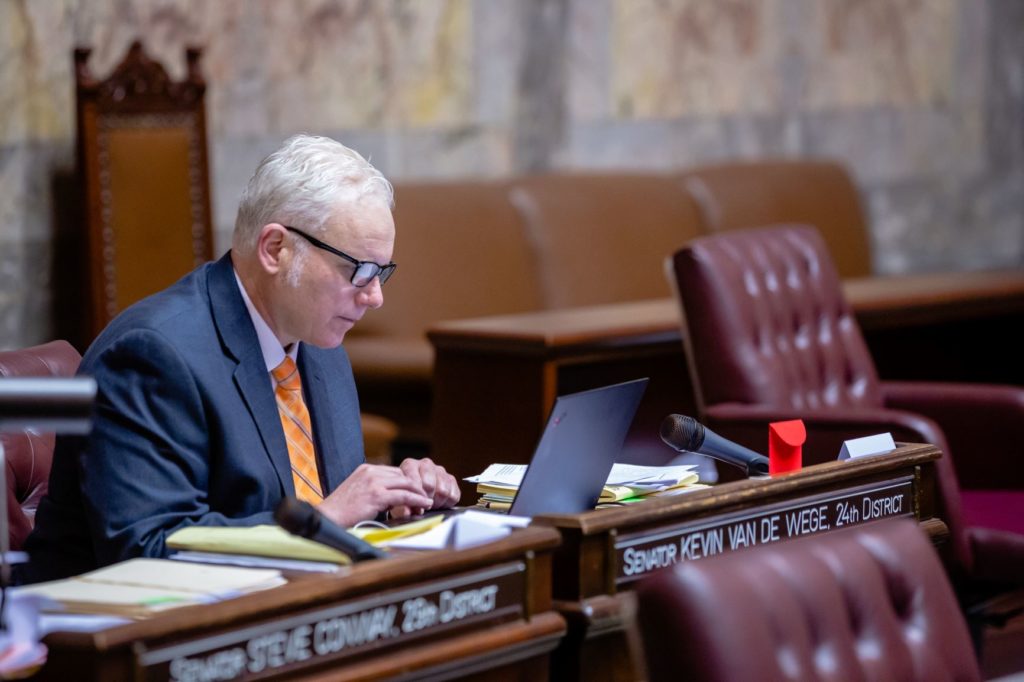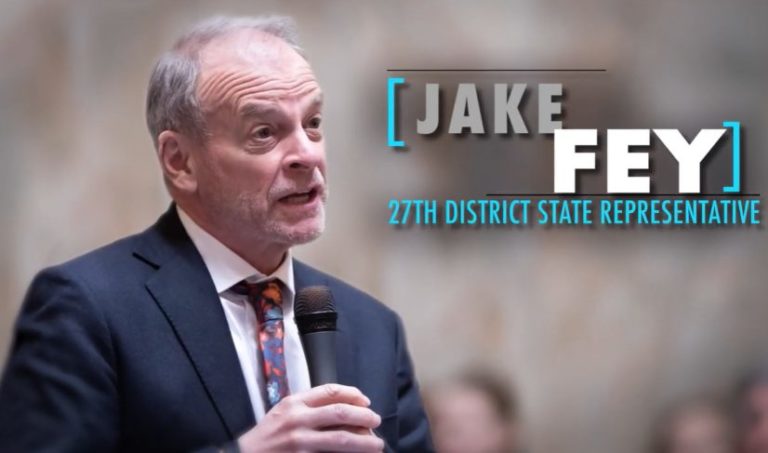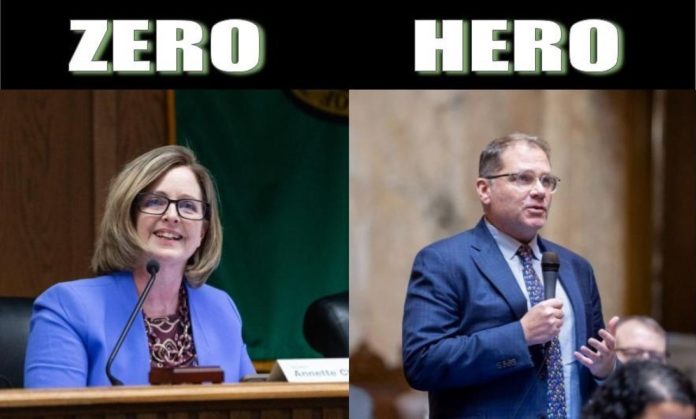
Session has come and gone, concluding the Washington State Legislature’s lawmaking work for 2024. Thus, it’s time for The Urbanist’s annual report on the legislative heroes and their counterpart zeroes.
In terms of laws passed, the output was relatively low, but some bills will have a significant impact. Some state leaders had pledged a “Year of Housing 2.0” building on a 2023 session when they passed a statewide missing middle housing standard and liberalized rules around accessory dwelling units. While most of the big bills with this housing push did not come to fruition this session, a few smaller bills did, such as one that should effectively re-legalize co-living micro-apartments. This has the potential to spur a building boom in an affordable housing type, providing more of a safety net for people experiencing housing insecurity and financial distress.
Overall, though, 2024 lacks a signature policy win of the caliber of years past. 2021 was the year of climate, with Washington implementing a cap-and-trade program raising billions for climate investments while raising costs on climate polluters. 2022 was the year of transportation via the $17 billion Move Ahead Washington package. As mentioned, 2023 was the year of housing. At best, 2024 was the year of microhousing, if not macro, and disappointing overall.
So why wasn’t more accomplished in 2024? Our zeroes list can offer some hints, with some lawmakers throwing up key roadblocks to efforts like boosting transit-oriented development (TOD) and rent stabilization. Check out our legislative recap panel for a deep dive on what went wrong this session, as well as some victories and hope for next time.
But part of the obstacle is also structural with Washington State’s part time legislature meeting for just 60 days in even years, it supercharges legislative work and debate into a tight window and positions any wrench in the works to derail the whole endeavor. In effect, it empowers the trolls guarding the bridge to bill passage. And guard they did.

You may note that all the zeroes (and heroes) are Democrats. My philosophy with Heroes and Zeroes is that Democrats control their own destiny with their comfortable majorities in both chambers. Lockstep Republican opposition narrows the path for bills, but the path is still pretty wide. It takes losing five Democratic senators or 10 Democratic representatives to even need a Republican vote to advance a bill. Occasionally, I’ve recognized Republicans when they’ve helped on a major initiative, like Rep. Andrew Barkis (R-2, Lacey) did with zoning reform. But generally Democrats don’t have to worry about Republicans being terrible if they have their own house in order.
Hero 1: Strom Peterson
Rep. Strom Peterson (D-21, Edmonds) turned in another strong effect this session. Peterson chairs the housing committee in the lower chamber, and worked to shepherd the rent stabilization bill through the house. It ended up being the senate that dropped the ball on that bill, but the house held up its end of the bargain, and Peterson deserves kudos, as do bill sponsors Emily Alvarado and Mia Gregerson (more on them later).
Peterson’s excellent track record this session included passing two bills aimed at poverty reduction and fostering self-sufficiency for low-income households. House Bill 2230 creates the Economic Security for All program that will allocate grants to families and individuals below 200% of the federal poverty level (less than $30,120 for individuals or $62,400 for a family of four).
“Many families live on the economic razor’s edge, despite often working full time. They are simultaneously one unexpected bill away from financial ruin and one boost away from self-sufficiency,” said Peterson in a statement. “We should work to tip the scales toward self-sufficiency. The Economic Security for All grant program will help families toward financial stability. It helps our neighbors climb out of poverty and is a smart use of taxpayer dollars.”
Peterson also introduced House Bill 2474, intended to hold local governments more accountable for refusing to site essential facilities like permanent supportive housing or emergency shelters. While it wasn’t a direct response to the rejection of 100 units of deeply affordable housing in Kenmore, the bill earned the moniker of the “Kenmore bill” and put the issue of “local control” front-and-center. Peterson was able to get the bill across the finish line in the House, but it was another casualty in the senate.
Zero 1: Annette Cleveland
On the flip side, Senator Annette Cleveland (D-49, Vancouver) did not spend her political capital fighting for the little guy. Holding posts in both the housing and transportation committees, she is in a position to be impactful. However, the biggest splash Cleveland made was a cringeworthy diatribe she broadcast about how she did not like rent stabilization and thought renters would be better off left to the whims of their landlords. Simply issuing a no vote in committee was not enough. Cleveland also took the unusual step of publishing a manifesto attacking the bill.
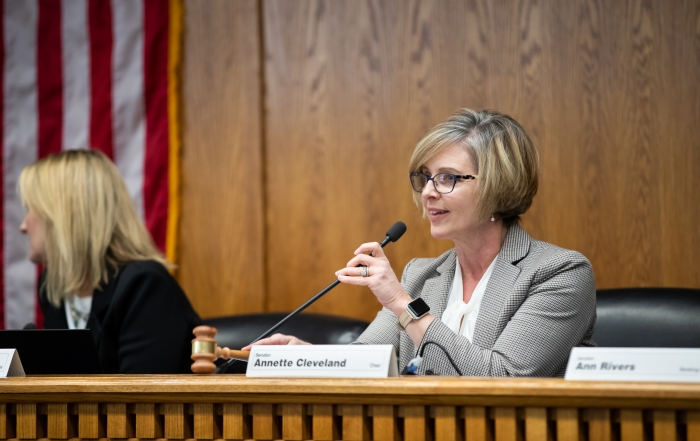
One big problem with Cleveland’s ‘let the market solve it’ approach is that the legislature dropped the ball on the main supply bill this session: the transit-oriented development bill. Slow action on housing supply puts landlords in a position to jack up rents.
Cleveland has also been on our radar for her work to widen I-5 in her district as part of the $7.5 billion (or more) Interstate Bridge Replacement project, an aim that is both costly and misguided. Vancouver’s downtown has been undergoing an exciting renaissance so it’s unfortunate that work is being jeopardized by the desire to jam a supercharged freeway interchange into the area.
Hero 2: Mia Gregerson
Rep. Mia Gregerson (D-33, SeaTac) led on a number of issues, from even-year election reform to rent stabilization and immigrant rights. Gregerson succeeded in getting her even-year reform bill out of the house, but unfortunately the senate couldn’t finish the job. It’s a great idea to bolster voter turnout in local elections so hopefully the legislature can come back and get the job down next year.
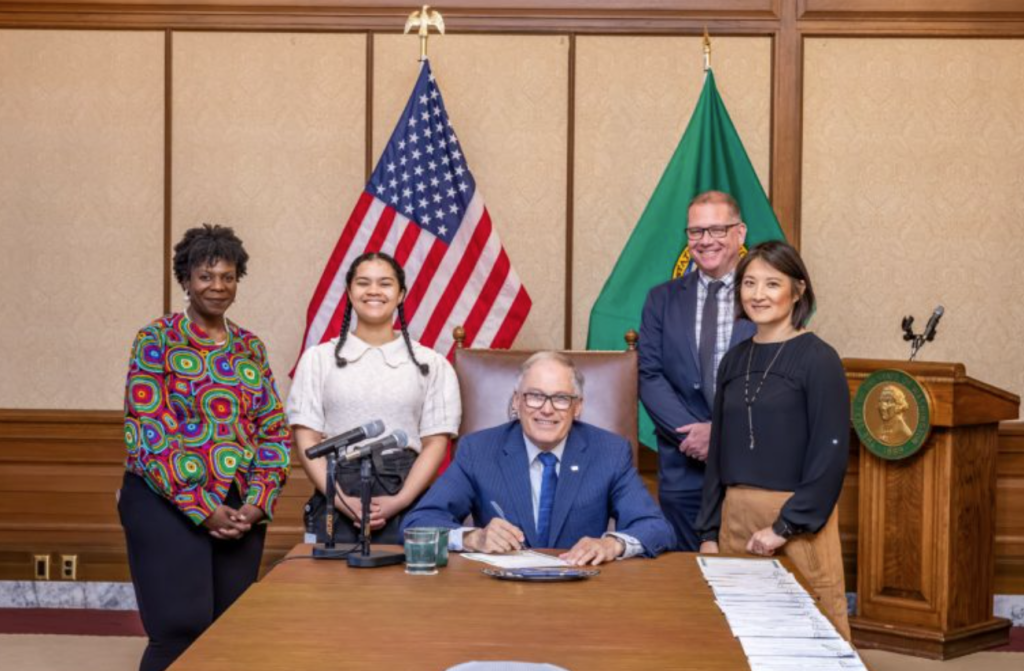
She was successful in getting House Bill 1998 fully across the finish line. That bill will require any city in Washington to re-legalize co-living housing, or single room occupancy (SRO) buildings on any lots that already allow at least six units of housing, providing builders with another option to provide the type of units that can be affordable to low-income residents and which also help create more interactive communities. Considering this was the first session the bill was introduced, Gregerson’s win is a big one.
Zero 2: Mark Mullet
Past “Zeroes” installments have flagged Mark Mullet (D-5, Issaquah) before, and this year Mullet continued to distinguish himself as a legislative pest and obstacle to progress. As Ryan Packer discussed at our panel breaking down the session, Mullet is so consistently known for killing progressive legislation that he is used as a scapegoat and shield for legislators who cannot stomach a vote but do not want to take heat for it. That’s what happened with the rent stabilization bill.
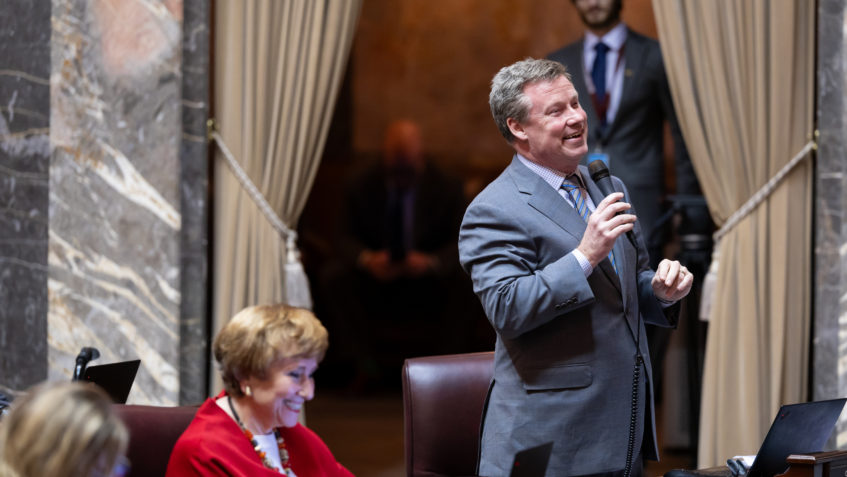
Mullet is running for governor, which will prevent him from also running for reelection in the senate. In a sendoff message, Mullet patted himself on the back for the bravery to buck his party leadership over the past 12 years, labeling himself socially progressive, but fiscally conservative. However, Mullet’s support for the Republican-backed ballot measure effectively repealing the Climate Commitment Act (CCA) would blow a giant hole in the state budget, which hardly seems fiscally prudent
In the gubernatorial primary, Mullet will challenge Democratic frontrunner Bob Ferguson, who as Attorney General has been pretty middle-of-the-road in his own right, rather than a raging progressive. Ferguson has made recruiting more police officers a central campaign plank. In contrast to Mullet, Ferguson opposes the CCA repeal effort and has pledged to continue Governor Inslee’s climate work rather than undermine and erase it.
Hero 3: Davina Duerr
Rep. Davina Duerr (D-1, Bothell) has the distinction of being the only legislator to be honored in all three previous “Heroes” installments, including top billing in 2022. By Jove, she did it again. In a year where a lot of urbanist-backed bills were dying by the wayside, Duerr found a way to keep her parking reform initiative alive by attaching it to another bill. That is the kind of creative initiative that is needed to make progress with the constraints of a 60-day session when the time to win over holdouts is short. The particular parking reform in question is aimed at encouraging builders to keep trees rather add pavement for parking as they redevelop a site, offering a win-win potential.
Earning recognition four times in a row is a testament to Duerr’s tenacity and skill. Of course, urbanists would also welcome if more of the caucus were trying as hard to pass legislation with as much impact on housing and the environment. Cities like Spokane and Port Townsend have shown parking reform isn’t so scary, and it’s good to have state lawmakers trying to build on that momentum. Broader parking reforms in future years would be a good idea.
Zero 3: Kevin Van De Wege
Sen. Kevin Van De Wege (D-24, Sequim) was Mullet’s partner in crime this session, as in the past, undermining key bills. The three senator zeros named so far are a big reason why it’s so hard to get good legislation through the senate despite a 29-20 Democratic advantage that should give them a reasonable cushion.
While one could find a silver lining in their willingness to “take the hit” for killing progressive legislation that at least we know where they stand, providing cover for other shier centrists is hardly a cause to be celebrated either.
Hero 4: Emily Alvarado
Rep. Emily Alvarado (D-34, Seattle) did what no other state legislator has done in recent memory; she shepherded a rent stabilization bill to pass out of a chamber. After running a housing whiz in 2022, Alvarado has delivered so far. She serves as vice chair in two committees that touch a lot of urbanist bills: housing and local government. Those committees have been more productive and less disruptive since she joined, which portends well for future sessions when initiatives zoning for housing density near transit and stabilizing rents will be back.
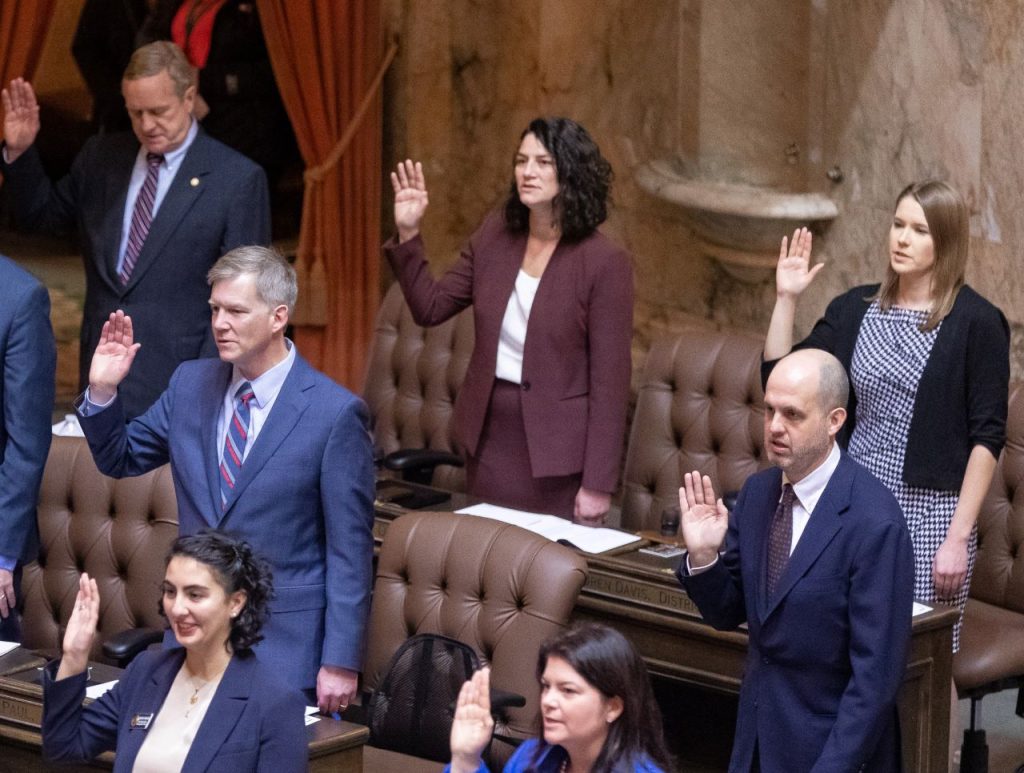
Key to the success Alvarado and her co-sponsors had was going to bat for her bill ahead of a looming legislative cutoff, calling a press conference to ramp up pressure on holdouts. It worked. In the past, too often bills were allowed to be killed quietly without a public fight. This session the house had the bravery to debate the merits of the bill more openly.
Zero 4: Jake Fey
As chair of the House transportation committee, Rep. Jake Fey (D-27, Tacoma) unfortunately has not embraced some aspects of what makes a successful 21st century transportation system and appears stuck in a car-centric windshield perspective. Fey’s transportation budget this session sought to defund a key part of Seattle’s SR-520 rebuild, and the main part of the project focused on improving conditions for people walking, rolling, and biking.
Fey’s budget would have indefinitely delayed the Roanoke lid and the bike and pedestrian trail that it would have completed. In a car project that cost many billions of dollars (with many aspects experiencing overruns) of course the one aspect deemed non-essential is the part serving non-drivers. To compound matters, splitting the project into additional phases would have ultimately added costs if the state ever followed through and built the delayed segment. Luckily cooler heads prevailed.
Hero 5: Marko Liias
The leader of those cooler heads was Sen. Marko Liias (D-21, Mukilteo). As chair of the Senate transportation committee, Liias fought to follow through on the project’s promise to complete the Roanoke Lid and complete a safe biking facility through Montlake, connecting Capitol Hill and the U District. Liias’ proposal won out as the two chambers reconciled the respective transportation budgets.
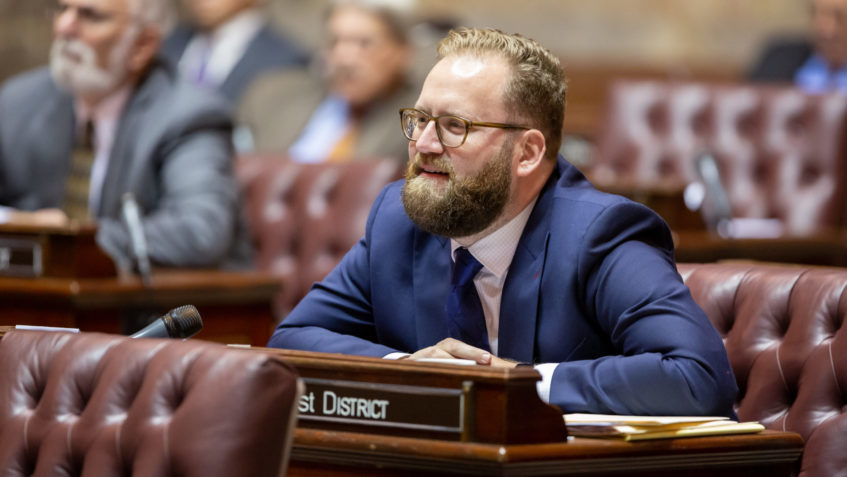
Liias has also championed transit-oriented development with a bill that cleared the senate last session, which makes him a frequent friend of urbanist causes. Getting the House and the Senate on the same page about the TOD bill has eluded lawmakers both last session and this one, but there’s hope that consensus is gradually building around a core of supporters that includes Liias, making statewide TOD reform inevitable… eventually anyway.
Zero 5: Liz Lovelett
Sen. Liz Lovelett (D-40, Anacortes) chairs the Senate’s Local Government, Land Use, and Tribal Affairs committee where a lot of bills went to die or get watered down. Some — none more so than the neighborhood cafe bill — came in with a lot of momentum, but left her committee with none. To make matters worse, Lovelett added a striker amendment that essentially erased the original intent of the bill, namely to make it easier to add cafes in more neighborhoods. Year of Housing 2.0 hopes were dashed in no small part by the lack of smooth passage through Lovelett’s committee.
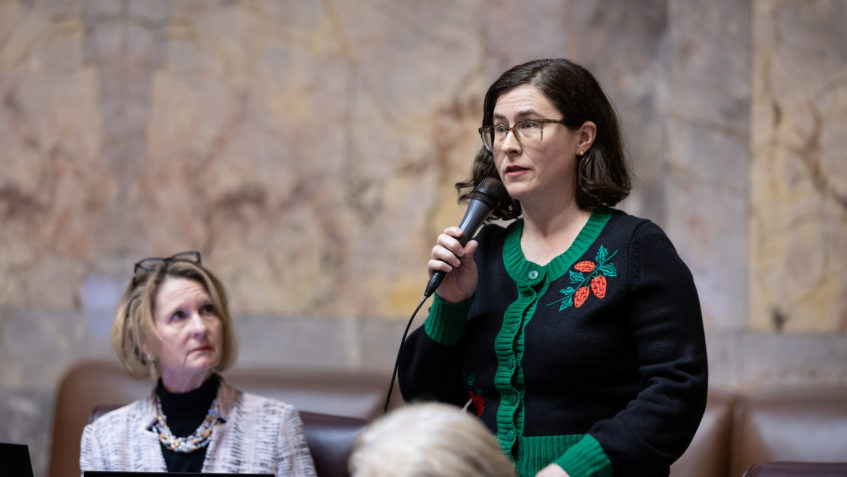
While Lovelett has styled herself as a climate champion, with work on geothermal energy and other environmental topics, it’s too bad she has not extended her climate work to her land use committee where parking and zoning reform could be encouraging greener lifestyles rather than letting the status quo car-sprawl culture reign.
Cheatsheet: 2024
Heroes
- Strom Peterson
- Mia Gregerson
- Davina Duerr
- Emily Alvarado
- Marko Liias
Zeroes
- Annette Cleveland
- Mark Mullet
- Kevin Van De Wege
- Jake Fey
- Liz Lovelett
Past winners
2023
- Hero 1: Rep. Jessica Bateman
- Hero 2: Sen. Yasmin Trudeau
- Hero 3: Rep. Davina Duerr
- Hero 4: Sen. Marko Liias
- Hero 5: Rep. Andrew Barkis
- Zero 1: Sen. Lisa Wellman
- Zero 2: Rep. Roger Goodman
- Zero 3: Sen. Christine Rolfes
- Zero 4: Sen. Bob Hasegawa
- Zero 5: Rep. Chris Stearns
- Hero 1: Rep. Davina Duerr
- Hero 2: Rep. Jessica Bateman
- Hero 3: Sen. Rebecca Saldaña
- Hero 4: Rep. Liz Berry
- Hero 5: Rep. Marcus Riccelli
- Zero 1: Sen. Kevin Van De Wege
- Zero 2: Sen. Mark Mullet
- Zero 3: Rep. Gerry Pollet
- Zero 4: Rep. Tana Senn
- Zero 5: House Majority Leader Pat Sullivan
- Hero 1: Rep. Joe Fitzgibbon
- Hero 2: Rep. Davina Duerr
- Hero 3: Rep. Jesse Johnson
- Hero 4: Sen. T’wina Nobles
- Hero 5: Rep. Noel Frame
- Zero 1: Sen. Steve Hobbs
- Zero 2: Rep. Gerry Pollet
- Zero 3: Sen. Kevin Van De Wege
- Zero 4: Sen. Annette Cleveland
- Zero 5: Sen. Mark Mullet
Doug Trumm is publisher of The Urbanist. An Urbanist writer since 2015, he dreams of pedestrian streets, bus lanes, and a mass-timber building spree to end our housing crisis. He graduated from the Evans School of Public Policy and Governance at the University of Washington in 2019. He lives in Seattle's Fremont neighborhood and loves to explore the city by foot and by bike.

